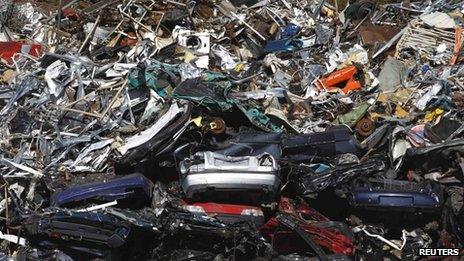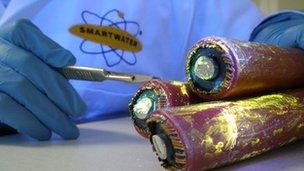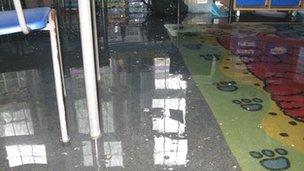Metal theft 'soft target' warning for councils
- Published

Police say metal thefts generally are falling but there is concern councils are being targeted at a time when their finances are stretched
Councils are being warned they are seen as soft targets by metal thieves as new figures reveal the cost to them.
Metal thefts cost councils in Wales at least £820,000 in 2011/12, according to figures obtained by BBC Wales.
Police say metal thefts generally are falling but there is concern council property is being targeted at a time when their finances are stretched.
Councils say efforts to combat the problem are starting to take effect.
A BBC Wales freedom of information request suggests the cost of metal thefts to councils in Wales has increased by around £144,000 compared to 2010/11 and by over £530,000 on the year before that.
Most councils were able to provide figures for the last year, and some for the past five years.
Two councils in the Gwent Police force area are thought to have been worst hit in the past year: Torfaen (£247,176) and Caerphilly (£132,431).
Sgt Simon Clark of Gwent Police, who works full time tackling metal theft, said he was surprised by the rise in the cost to councils when overall figures were coming down.
"Across Wales, metal theft has been reduced by 22% in the last year and in Gwent it's been reduced by 45%," he said.
"I think councils are seen as a bit of a soft target."
Metal thefts have cost Welsh councils over £2.5m in the past five years, according to the figures.
Torfaen council has been particularly hard hit recently. Incidents have included a school badly damaged by rain after lead was stolen from the roof (costing £11,000), and the theft of a water tank, boiler and copper pipe at a football club changing rooms (£18,000).

Councils are using SmartWater, which can be seen under UV light, to catch thieves
Anthony Hunt, Torfaen's executive member for resources, said every penny spent on damage was a penny lost from frontline services.
"With the rise in the scrap metal value, it suddenly became a problem," he said.
"But because we've worked closely with the police and metal collectors, hopefully that will lead to a big improvement in this."
He said the council had taken action, with one of its main weapons being SmartWater, which is used to mark items with a special liquid that is invisible to the naked eye but can be seen under UV light.
The SmartWater is applied to everything from computers to manhole covers and cannot be washed off.
Last year, it helped bring about the jailing of a man for the theft of lead in Pontypool.
"Anyone who thinks Torfaen is a soft target has certainly got the wrong idea and the full force of the law will be brought against them," added Mr Hunt.
Other local authorities in Wales have also been hit hard.
The cost to Rhondda Cynon Taf (RCT) last year was £110,000 and, over the past five years, the council has been hit with a bill for £400,000 because of metal thefts.
A total of 16 schools in RCT were affected, including Tonypandy Primary School which was targeted twice by lead thieves over the summer leaving holes in the roof which caused rain damage.
Many other councils elsewhere also reported lead thefts from schools including Flintshire, Powys, Anglesey, Denbighshire and Vale of Glamorgan.
Metal thefts present a major problem for the police, accounting for around 10% of all crimes.
Officers say they take it very seriously and a number of operations have been taking place to combat it.
Sgt Clark is working on Operation Tornado, a scheme being introduced in the whole of the UK where scrap operators insist on seeing a seller's photographic ID and a utility bill before buying metal.
But even then there can be problems.
"The scrapyards have to keep a book - who has come in, name and address, what vehicle has brought it in, and time and date," he said.
Metal seized
"What happens is they don't check those details are valid. We've had Elvis Presley taking scrap in, Joe Bloggs, we've had all sorts."
He said Gwent Police were taking action to ensure scrapyards were complying with the record keeping.
In another operation, 20 people were arrested and thousands of pounds worth of material recovered during a three-week crackdown in Caerphilly county.
British Transport Police and Gwent Police carried out checks on so called "itinerant collectors", stopping and searching 44 vehicles with 15 loads of scrap metal seized.
Det Insp Mark Cleland, of British Transport Police, said officers were looking to expand the operation into other areas in the Gwent Police force area and further afield.
"It's saving lives at the end of the day. These people are recklessly stealing metal that has the potential to kill people," he said.
"It's not about what they steal it's the consequences.
"If you steal signalling cable, then signals don't work; if you steal a manhole cover, there's a hole in the road."
Det Insp Cleland is part of a pan-Wales group - which includes police, local authorities and various companies - which meets every three months to share information to try to prevent thefts.
Ministers in Westminster are also trying to clean up the industry and make it easier to trace the source of scrap metal by banning cash transactions at scrapyards.

Classrooms at Tref-y-Rhyg, Tonyrefail, were damaged when thieves stole lead from the roof
And an MP's Private Member's Bill aims to introduce a more robust licensing regime.
The body representing councils in Wales, the Welsh Local Government Association, said the seriousness of the crime had been recognised by government at all levels.
"Councils in Wales are also beginning to adapt their operational practices," said a spokesperson.
"Many use SmartWater... and items such as metal bins are increasingly being replaced by plastic or other composite materials.
"In some areas this has already resulted in as much as a 50% reduction in metal theft."
The spokesperson said that thefts added "an extra financial burden on local government finances that have already been stretched by the severe economic climate".
- Published4 October 2012
- Published1 September 2012
- Published18 August 2012
- Published16 August 2012
- Published4 July 2012
- Published19 July 2011